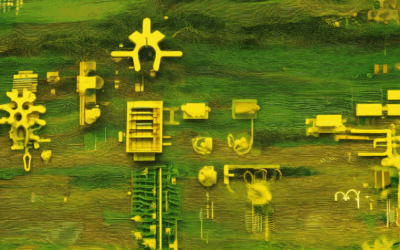As we step into the new year, the tech industry is abuzz with excitement, poised to revolutionize the way we live and work. In the realm of the banking industry, the latest tech trends are transforming the landscape, offering unparalleled opportunities for growth and innovation. From the emergence of cutting-edge technologies like artificial intelligence and blockchain, to the rise of cloud computing and edge computing, the future of banking looks brighter than ever. With the convergence of technology and finance, the possibilities seem endless, and it’s time to explore what’s in store for the industry in 2024.
According to recent reports, the top emerging technologies in the IT industry are expected to shape the future of banking, with a focus on enhancing security, improving efficiency, and driving innovation. As we delve into the world of the latest tech trends, one thing becomes clear – the future of banking is here, and it’s going to be shaped by the most forward-thinking technologies.
The intersection of technology and finance has never been more critical, with the need for secure, efficient, and innovative solutions driving the demand for the latest tech trends. As we navigate the complex landscape of technological advancements, it’s essential to stay ahead of the curve and explore the top new technologies that are set to transform the banking industry in 2024.
From the impact of 5G on faster transactions, to the rise of IoT devices and their influence on the industry, the latest tech trends are redefining the way banks operate. As we look to the future, it’s clear that the banking industry will continue to evolve, driven by the most innovative and forward-thinking technologies.
In this article, we’ll take a closer look at the top emerging technologies in the banking industry, exploring the trends that are shaping the future of finance. Whether you’re a seasoned professional or just starting out, understanding the latest tech trends is crucial for staying ahead of the curve and capitalizing on the opportunities they present.

Trending Technologies in 2025
The year 2025 promises to bring about significant advancements in various fields, with several emerging technologies poised to shape the future.
- Extended Reality (XR): XR encompasses Virtual Reality (VR), Augmented Reality (AR), and Mixed Reality (MR). These technologies continue to evolve, enabling immersive experiences that blur the lines between physical and digital worlds.
- Quantum Computing: As quantum computing gains momentum, it’s expected to revolutionize industries such as cryptography, optimization problems, and artificial intelligence.
- Internet of Bodies (IoB): IoB refers to the integration of sensors, wearables, and implantable devices into the human body. This trend has far-reaching implications for healthcare, fitness, and personal security.
- Autonomous Systems: Autonomous vehicles, drones, and robots are becoming increasingly prevalent, driven by advances in computer vision, machine learning, and sensor technologies.
- Blockchain and Distributed Ledger Technology: Blockchain continues to gain traction, with applications in supply chain management, identity verification, and secure data storage.
- 5G Networks: The rollout of 5G networks promises faster data transfer rates, lower latency, and greater connectivity, paving the way for widespread adoption of IoT devices and smart cities.
- Synthetic Biology: Synthetic biology involves the design and construction of new biological systems, such as microorganisms, to produce biofuels, clean up environmental pollutants, and create novel materials.
- Edge Computing: Edge computing enables real-time processing and analysis of data at the edge of the network, reducing latency and improving efficiency in applications such as autonomous vehicles and smart homes.
- Natural Language Processing (NLP): NLP continues to advance, with applications in chatbots, voice assistants, and language translation software.
- Cybersecurity: As technology advances, cybersecurity threats are becoming increasingly sophisticated, making it essential to develop robust security measures and stay informed about emerging risks.
- Biotechnology: Biotechnology is driving innovation in fields such as gene editing, regenerative medicine, and personalized healthcare.
- Space Exploration: With private companies like SpaceX and Blue Origin leading the charge, space exploration is experiencing a resurgence, with potential breakthroughs in areas such as asteroid mining and lunar colonization.
- Energy Storage: Advancements in battery technology and energy storage solutions are crucial for a sustainable future, enabling widespread adoption of renewable energy sources.
- Artificial General Intelligence (AGI): AGI aims to create intelligent machines that can perform any intellectual task, raising important questions about ethics, responsibility, and the future of work.
- Robotics: Robotics is transforming industries such as manufacturing, logistics, and healthcare, with applications in areas such as assembly, inspection, and patient care.
- Environmental Sustainability: As concern for climate change grows, technological innovations are focused on reducing carbon emissions, promoting renewable energy, and developing eco-friendly products.
- Advanced Materials: New materials and manufacturing techniques are being developed to address pressing challenges such as energy storage, aerospace engineering, and medical device development.
- Digital Twins: Digital twins involve creating virtual replicas of physical systems, enabling real-time monitoring, simulation, and optimization of complex processes.
- Human-Machine Interfaces: Human-machine interfaces are evolving to provide more intuitive and natural interactions between humans and machines, with applications in areas such as gaming, education, and healthcare.
- Quantum Cryptography: Quantum cryptography uses quantum mechanics to ensure secure communication, offering unparalleled levels of encryption and protection against cyber threats.
- Smart Cities: Smart cities integrate technology and infrastructure to create more efficient, sustainable, and livable urban environments.
What’s the Next Big Tech Trend?
The rapidly evolving landscape of technology has given rise to numerous innovative trends that are set to transform various industries in the coming years.
- Artificial Intelligence (AI) Advancements: AI is expected to continue its upward trajectory, driving significant improvements in areas such as natural language processing, computer vision, and predictive analytics.
- Extended Reality (XR): Building upon the success of Virtual Reality (VR), Extended Reality encompasses augmented reality (AR), mixed reality (MR), and virtual reality (VR). XR is poised to revolutionize entertainment, education, and healthcare.
- Quantum Computing: As quantum computing continues to mature, we can expect breakthroughs in fields such as cryptography, materials science, and optimization problems.
- Internet of Bodies (IoB): The integration of technology into the human body is becoming increasingly prevalent, with advancements in wearable devices, implantable sensors, and bioelectronics.
- 5G Networks: The widespread adoption of 5G networks promises faster data transfer rates, lower latency, and greater connectivity, paving the way for widespread IoT adoption.
- Autonomous Systems: Autonomous vehicles, drones, and robots are set to become increasingly common, transforming industries such as logistics, transportation, and manufacturing.
These emerging technologies have the potential to significantly impact various aspects of our lives, from entertainment and education to healthcare and commerce.

Trends in the IT Industry
The IT industry is undergoing significant transformations, driven by technological advancements and shifting consumer demands. Here are the top 3 trends shaping the future of IT:
- Artificial Intelligence (AI) Integration: AI is becoming increasingly pervasive across various industries, transforming the way businesses operate and interact with customers. From chatbots and virtual assistants to predictive analytics and automation, AI is revolutionizing the IT landscape.
- Cloud Computing Advancements: Cloud computing continues to evolve, with a growing focus on edge computing, serverless architectures, and hybrid cloud models. These innovations enable greater flexibility, scalability, and security, making it easier for organizations to deploy and manage applications.
- Internet of Things (IoT) Expansion: As IoT devices become more widespread, they’re generating vast amounts of data that need to be processed, analyzed, and secured. To address these challenges, IT professionals must develop expertise in IoT security, data management, and analytics to unlock the full potential of connected devices.
These trends are not only driving innovation but also creating new opportunities for growth, collaboration, and problem-solving within the IT industry. By staying ahead of the curve and embracing emerging technologies, organizations can stay competitive, agile, and responsive to changing market conditions.
Trending Technologies in 2024
- Artificial Intelligence (AI) Advancements: Expect significant improvements in natural language processing, computer vision, and robotics, leading to increased adoption in industries like healthcare, finance, and education.
- Extended Reality (XR): XR technologies, including virtual reality (VR), augmented reality (AR), and mixed reality (MR), will continue to gain traction, transforming entertainment, education, and remote work experiences.
- Quantum Computing: As quantum computing becomes more accessible, it will revolutionize fields like cryptography, materials science, and optimization problems, enabling breakthroughs in complex systems and simulations.
- 5G Networks and Edge Computing: The integration of 5G networks with edge computing will accelerate data processing, enabling real-time analytics, IoT device management, and smart city infrastructure development.
- Blockchain and Distributed Ledger Technology: Blockchain applications will expand into supply chain management, identity verification, and digital rights management, driving trust, security, and efficiency in various sectors.
- Internet of Bodies (IoB) and Wearable Technology: The IoB will become increasingly prevalent, with advancements in implantable devices, wearable sensors, and bio-sensing technologies, transforming healthcare, fitness, and personal productivity.
- Autonomous Systems and Robotics: Autonomous vehicles, drones, and robots will become more widespread, driven by advances in machine learning, computer vision, and sensor fusion, leading to improved safety, efficiency, and productivity.
- Cybersecurity and Data Protection: As technology advances, cybersecurity threats will escalate, necessitating robust data protection measures, advanced threat detection, and incident response strategies.
- Sustainable Energy and Environment: Renewable energy sources, energy storage solutions, and eco-friendly technologies will play a crucial role in mitigating climate change, reducing carbon emissions, and promoting sustainable development.
- Biotechnology and Gene Editing: Gene editing tools like CRISPR will continue to transform biotechnology, enabling precise modifications to genetic material, advancing disease treatment, and improving crop yields.
Top Emerging Technologies for Future 2025
- Artificial Intelligence (AI) Advancements: Expect significant breakthroughs in natural language processing, computer vision, and machine learning, leading to widespread adoption across industries.
- Extended Reality (XR): Augmented reality (AR), virtual reality (VR), and mixed reality (MR) technologies will continue to evolve, transforming entertainment, education, and healthcare.
- Quantum Computing: As quantum computing becomes more accessible, it will revolutionize fields like cryptography, optimization, and simulation, enabling faster and more efficient problem-solving.
- Internet of Bodies (IoB): Wearable devices and implantables will become increasingly prevalent, blurring the lines between humans and machines, and opening up new avenues for health monitoring and management.
- 5G Networks and Edge Computing: Next-generation wireless networks will provide ultra-high-speed connectivity, while edge computing will enable real-time data processing and analysis, driving innovation in IoT, smart cities, and more.
- Cybersecurity and Biometrics: Advanced threat detection systems and biometric authentication methods will become essential tools in protecting sensitive data and preventing cyber attacks.
- Sustainable Energy and Environment: Renewable energy sources, green infrastructure, and eco-friendly technologies will play a crucial role in mitigating climate change and promoting environmental sustainability.
These emerging technologies will shape the future landscape, presenting opportunities for growth, innovation, and transformation across various sectors.

Emerging Trends: Understanding the Latest Shifts
The concept of emerging trends refers to the rapidly growing popularity of certain topics or keywords within a short period, typically measured over 24 hours.
- Characteristics: Emerging trends exhibit increased social attraction, garnering more discussion and attention than other topics.
- Measurement: The emergence of a trend can be quantified through its rapid growth in online engagement, social media buzz, and search volume.
Factors Contributing to Emerging Trends
Several factors contribute to the emergence of trends, including:
- Changing consumer behavior: Shifting attitudes and preferences among consumers can lead to the rise of new trends.
- Technological advancements: Innovations in technology can create new opportunities and drive the emergence of fresh trends.
- Social media influence: Social media platforms play a significant role in shaping public opinion and driving the popularity of emerging trends.
Identifying Emerging Trends
To identify emerging trends, consider the following strategies:
- Monitor social media conversations: Track popular hashtags, trending topics, and social media chatter to gauge interest in emerging trends.
- Analyze search volume data: Examine search trends and patterns to determine which topics are gaining traction.
- Keep up-to-date with industry news: Stay informed about the latest developments and breakthroughs in various industries to anticipate emerging trends.
Seizing Opportunities with Emerging Trends
Embracing emerging trends can provide businesses and individuals with opportunities to capitalize on growing demand and stay ahead of the curve:
- Stay agile and adaptable: Be prepared to pivot and adjust strategies in response to changing market conditions and emerging trends.
- Invest in innovation: Encourage creativity and experimentation to develop new products, services, and solutions that meet the evolving needs of customers.
- Build strategic partnerships: Collaborate with influencers, thought leaders, and other stakeholders to amplify reach and drive growth.




0 Comments